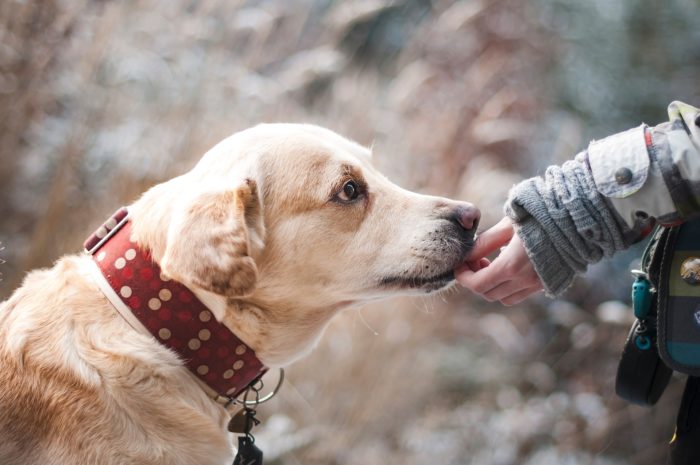This post is written by HoneyGood.com Guest Contributor, Kimberly Artley. Kimberly explains her dog training and behavior business PACKFIT and explains why finding understanding between canines and their owners is essential.
What We Do at PACKFIT
At PACKFIT, we specialize in canine behavioral issues and challenges. What this translates to is we fill in the blanks and connect the dots for people who are struggling to understand their dogs. As dogs and those who have many questions surrounding their behaviors are seeing.
When a question mark exists, the human brain works tirelessly to create an explanation and devise an answer. These explanations and answers typically stem from our own beliefs and adopted belief systems; most of which will condition untruths about ourselves and the world around us. These include emotional states such as fear, anxiety and insecurities, experiences, education, and popular opinion. It’s human nature to seek a sense of certainty and resolve, but we must leave space for allowance and discovery.
The problem is a “story” is what we often came up with and attach to other people, situations, and especially dogs. This story is entirely untrue simply because of the source from which we’re drawing our conclusions.
We see this quite frequently with rescue dogs. The two most common scenarios include:
1. A Dog with a Tragic Past
These dogs come into rescue and the rescuer tries to compensate for every wrong ever done to the dog. When introducing the dog, the “story” is told; not the dog as the individual or by name. It’s, “This is Cracker Jack. He lived on a chain for the first 4 years of his life and was fed once every 2 weeks.” As a result, Cracker Jack enters a situation where he has overflowing buckets of toys, food left down in bowls, all the privileges in the world, constant affection and attention and regular cooing and coddling.
While hearts are pure and intentions are good, when we attach ourselves to the story of a dog’s past and continue to regurgitate it, we keep the past alive. When we keep the past alive, we prevent forward movement. Moving beyond the story.
When we are constantly giving and the dog is constantly gaining and receiving without earning, rules, guidance, boundaries and limits, we start to condition certain behaviors and personality types much like with children. And above all, when we are attempting to “lead,” teach, and guide through an emotional space–feeling sorry, guilt, fear or anger—no dog will trust, respect or feel safe or secure following this type of energy. We keep the broken, broken.
2. A Dog Welcomed into Our Hearts and Homes
After the initial decompression and feeling out period, where both dogs and people are “feeling” each other out, getting to know personalities and personal boundaries, the dog’s true personality starts to make itself known. However, what people don’t realize is that this is rarely the case. “Behavior” is heavily layered. While a dog will bring genetics and individuality to the table, what we will see is the dog’s direct response to their needs being met and provided for, and conversely what is not. The degree to which this matters will vary from dog to dog, as well as how it impacts and affects them.
For example, a “strong energy” dog vs. a “soft energy” dog, a “timid, shy” dog vs. a “more confident and self-certain dog”, a “happy-go-lucky dog” vs. a “more uptight or fearful dog”, an “introverted dog” vs. an “extroverted dog”. When we observe certain behaviors that manifest and we can’t explain them, our brains immediately go to work to find or create an explanation. This place usually involves the dog as damaged somehow because he or she is “a rescue” or in the case of a timid, squeamish, shy or fearful dog, must be abused or neglected.
My Own Dogs
Case in point: I have a four-pack of my own. All but one I’ve had since they were puppies. Each of them has very different personalities. They range from highly sensitive to not so much. Assertive to a bit shyer. Extroverted to more introverted. Independent to more pack-oriented. Insanely high prey drive to relatively low prey drive. Happy-go-lucky to more reserved.
My female, who’s incredibly self-certain and more independent but also highly, highly sensitive and squeamish – she’s such an interesting combination – has zero trauma, zero abuse, and zero neglect. She is very well cared for and gets the same exposure, guidance, leadership, that all my other dogs have. Sadly, people will see her squeamish response and behaviors and draw a conclusion that she has been abused, or endured some kind of hardship somehow; when this is so very far from the truth.

Finding Understanding
To work with our dogs, we must first have some sort of understanding of our dogs. Who they are as the individual, and in the present moment. The dog in front of us. This comes through the first element we teach, foundational training. Relationship building. Building that ever-important trust and respect factor. This occurs through learning what our dogs instinctual and breed-specific needs can be. As well as working to meet and fulfill them daily by spending time, offering our undivided attention, energy, and focus. This is an irreplaceable gift and a most necessary one.
Understanding Both Perspectives
Before we begin work with any human and canine partnership, we always conduct the IBAC (Initial Behavioral Assessment and Consultation). This is such a critical part of our training protocol. During the IBAC, we’re able to get the human side of the story, as well as the dog’s perspective. More often than not, the two are quite different, as dogs will always give us the most genuine feedback and information.
When we can make the shift from being “dog lovers” to “dog-understander-ers”, we can better learn how to understand what our dogs’ behaviors are trying to tell us. After all, it’s all information. We’re in constant dialogue with our dogs, especially and when we’re not speaking at all.
Releasing story gives permission for all of us to move forward in a more authentic, liberated way, creating space to evolve and become our best version of self through trusted support and our own truth. Dogs especially and included.
 Kimberly Artley is the Founder of PACKFIT: Dog Training and Behavior, author of the celebrated book, “My Dog, My Buddha“, and has been described as the “Mary Poppins” of dog training. Her experience with her “game changer dog”, Lobo, in combination with her background of nutrition, psychology, learning, and behavior, for both human and canine, blend seamlessly together, allowing her to take a most comprehensive approach to successfully addressing a wide variety of canine behavioral challenges.
Kimberly Artley is the Founder of PACKFIT: Dog Training and Behavior, author of the celebrated book, “My Dog, My Buddha“, and has been described as the “Mary Poppins” of dog training. Her experience with her “game changer dog”, Lobo, in combination with her background of nutrition, psychology, learning, and behavior, for both human and canine, blend seamlessly together, allowing her to take a most comprehensive approach to successfully addressing a wide variety of canine behavioral challenges.

What a lovely article, thank you for sharing this with your darlings. I’m so happy I found your blog, and really love your style and your heart.
Dear Honey,
Thank you for sharing Kimberly Artley and her area of expertise in dog training and behavior. Our family advocates rescue pets when adding to our family. Both of my daughters have two wonderful rescue pooches each whom we all love and adore…and yes shower with unconditional love 💕.
Each pooch has their unique “story” and Kimberly has great advise!!! Now we have better insight with certain challenging behaviors. “When we keep the past alive we prevent forward movement” and “…dogs will always give us the most genuine feedback and information “…GREAT advice! 🙌🏼 🐾🐾❣️
Thank you for always finding and sharing such great contributors to offer us additional relevant information.
You are very welcome.I am so glad you enjoyed Kim’s written thoughts.As I am sure you know…Dog is God spelled backwards. We adore our pooches because we are able to give back to their unconditional love for us. Warmly, Honey